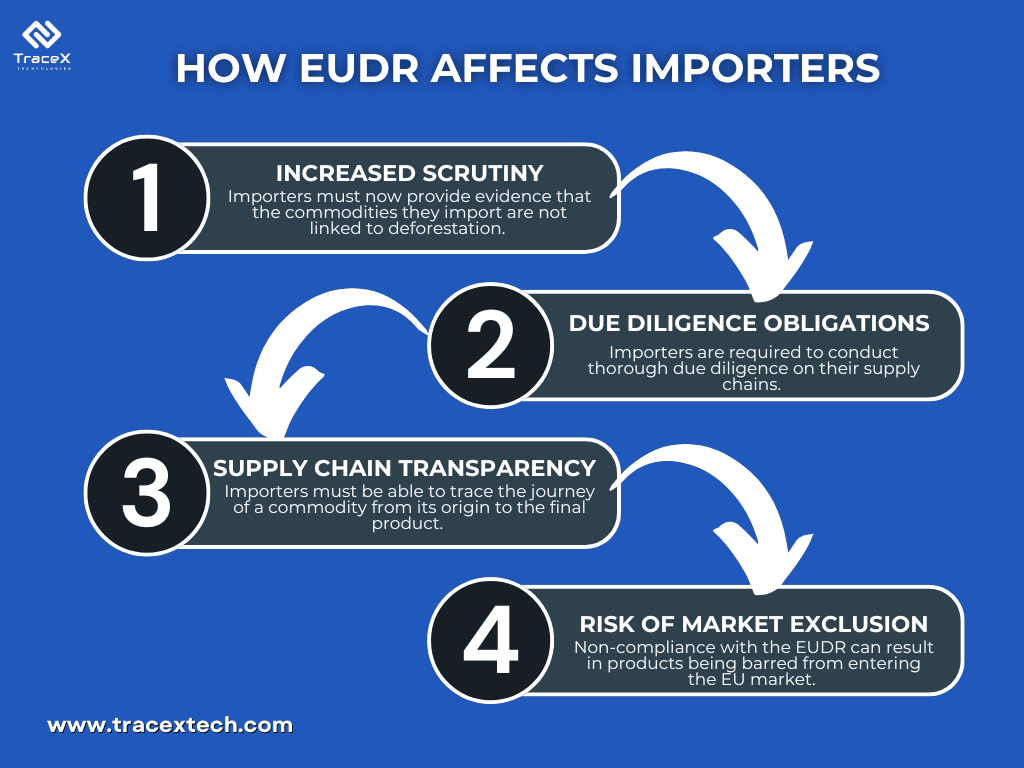Contact: +91 99725 24322 |
Menu
Menu
Quick summary: Ensure seamless EUDR compliance with this 5-step checklist for importers. Learn how to mitigate risks, enhance supply chain transparency, and secure your global market access.

Is Your Business Ready for EUDR Compliance? Importing coffee, cocoa, soy, palm oil, rubber, or timber into the EU? You must prove your supply chain is deforestation-free—or risk losing market access. The clock is ticking. Are you compliant? European Union Deforestation Regulation (EUDR) requirements for importers can be daunting for forest-risk commodities. With stringent rules now in place, the stakes are high—non-compliance could mean losing access to a crucial market.
Large importers and SMEs are prohibited from bringing products into the EU if they originate from agricultural lands deforested after December 30, 2020. By the December 30, 2025 deadline, traders and operators of these products must begin declaring their product components to prove they are not connected to deforested areas.
Many importers find themselves overwhelmed by the complexity of supply chains, the need for full traceability, and the pressure to ensure their products are deforestation-free. But with the right tools and a proactive approach, staying compliant is not only possible but can also protect your business’s future.
Key Takeaways
The EUDR is a groundbreaking regulation aimed at preventing deforestation and promoting sustainable land use practices worldwide. Enacted in response to increasing environmental concerns, the regulation aims to halt the import of products linked to deforestation into the European Union. It applies to a range of products, from timber and soy to palm oil, cattle, rubber, cocoa and coffee. In essence, the EUDR prohibits the sale of products linked to deforestation or forest degradation in the EU market. This law is not just about protecting forests but also about addressing broader environmental challenges, such as climate change and biodiversity loss, which are closely linked to deforestation.
This regulation is significant because it shifts the responsibility onto importers and businesses, making them accountable for ensuring that their supply chains are free from deforestation.
EU countries will conduct on-site checks and risk analyses for EUDR compliance, focusing on high-risk areas for deforestation. Non-compliance could result in fines of up to 4% of the previous year’s sales, confiscation of revenues, or the seizure and refusal of prohibited products at the border.
The EU Deforestation Regulation (EUDR) is a comprehensive framework designed to address the environmental impact of deforestation, particularly in relation to global trade. Understanding its scope is essential for importers who need to navigate this complex regulation while ensuring that their supply chains remain compliant and sustainable.
The EUDR targets specific commodities known to be significant drivers of deforestation. These include:
Soy: Widely used in animal feed and food products, soy production has been linked to large-scale deforestation, especially in regions like the Amazon and Cerrado in Brazil.
Palm Oil: A common ingredient in many everyday products, palm oil production is a leading cause of deforestation in Southeast Asia, affecting biodiversity and contributing to greenhouse gas emissions.
Coffee and Cocoa: Cultivated in tropical regions, the expansion of coffee and cocoa plantations has often led to the clearing of forests, impacting local ecosystems and communities.
Rubber: A critical raw material in the automotive and manufacturing industries, rubber production, particularly in Southeast Asia, has been associated with significant deforestation. Expanding rubber plantations in countries like Indonesia, Thailand, and Vietnam often encroach on tropical forests, leading to habitat destruction, loss of biodiversity, and increased carbon emissions.
Wood: As a raw material, wood is integral to many industries, but unsustainable logging practices have contributed to the depletion of forests worldwide.
Beef and Leather: The cattle industry is another major driver of deforestation, particularly in South America, where forests are cleared for grazing land.
The regulation also extends to partially processed and derivative products, such as leather, chocolate, furniture, paper, beef, and charcoal.

If you’re an importer of coffee, cocoa, soy, palm oil, rubber, beef, or timber, the EU Deforestation Regulation (EUDR) is now your reality. It’s no longer enough to just source responsibly—you need proof.
That means geo-tagging every supplier, verifying deforestation-free origins, and submitting detailed compliance reports—or risk losing access to the lucrative EU market.
Not sure where to start? Here’s a step-by-step checklist to make EUDR compliance simple and stress-free.
Imagine you’re buying coffee from multiple suppliers. How do you know where each batch comes from? Without precise geolocation, you can’t prove deforestation-free sourcing.
What to do:
How Digital Tools Help
The EU isn’t taking any chances—if there’s even a slight deforestation risk, your shipment could be rejected.
What to do:
Your shipment might get stuck at EU customs, causing delays, extra costs, or even a total import ban.
How Digital Tools Help
Manual tracking doesn’t work anymore—EUDR demands full supply chain transparency. That means you need a system that connects raw material origins to finished goods.
What to do:
💡 What Importers Are Saying:
“Switching to digital traceability helped us meet EUDR requirements in half the time!”
How Digital Tools Help
Compliance paperwork is a nightmare. But the EUDR requires every importer to submit a Due Diligence Statement (DDS)—detailing supplier origins, sustainability certifications, and deforestation risk analysis.
What to do:
Without an EUDR-compliant DDS, your shipments won’t make it past EU borders.
How Digital Tools Help:
Even after you submit your reports, the EU will audit your supply chain at any time.
What to do:
Failed audits mean rejected shipments, financial penalties, and reputational damage.
How Digital Tools Help:
EUDR isn’t just another regulation—it’s a market-shaping force that determines whether your products can legally enter the EU. If you fail to comply, you’re not just facing paperwork issues—you’re putting your entire business at risk.
Imagine this: You’ve spent months negotiating deals, securing shipments, and meeting buyer demands—only to have your entire container held at EU customs because you can’t prove your coffee, rubber, or soy is deforestation-free.
Implement real-time digital traceability so that every batch has verified proof of compliance before shipment.
The EU is cracking down hard on deforestation-linked imports. If your supply chain isn’t verifiable, you could face legal consequences, financial penalties, and permanent trade restrictions.
Automate Due Diligence Statement (DDS) submissions with digital compliance solutions that integrate with the EU Information System (EU-IS).
The EU is the world’s second-largest importer of agri-commodities, and big brands won’t take chances with non-compliant suppliers. If you can’t provide proof of deforestation-free sourcing, your buyers will move on.
Build supply chain transparency with blockchain-powered traceability, so your products stand out as 100% EUDR-compliant.
Today’s consumers want to know where their products come from. If a retailer or importer is caught sourcing from deforestation-linked suppliers, the backlash is swift and unforgiving.
Turn compliance into a competitive advantage by using geo-mapped supplier data and blockchain-backed proof of ethical sourcing.
Complying with the EU Deforestation Regulation (EUDR) can feel overwhelming—managing supplier geolocation data, risk assessments, due diligence statements (DDS), and regulatory submissions is a huge administrative burden. But what if you had a platform that automated it all? That’s exactly what TraceX’s EUDR Compliance Platform does.
One of the biggest hurdles importers face is that EUDR requires farm-level GPS coordinates for all suppliers. Many businesses only track their Tier 1 suppliers—but now, every plantation and farm in the supply chain must be mapped.
How We Solve It:
✔ Automated geotagging & digital farm mapping for every supplier.
✔ Satellite & AI-powered land-use verification to ensure no deforestation.
✔ Centralized supplier database that’s audit-ready at all times.
How a Nigerian Cocoa Exporter Ensures Deforestation-Free Sourcing with TraceX!
See how farm mapping & Restricted Zone technology helped this leading trading company achieve EUDR compliance, boost supply chain transparency, and drive sustainability.
EUDR compliance isn’t just about having supplier data—importers must also assess deforestation risk based on historical land use and satellite monitoring.
How We Solve It:
✔ AI-powered supplier risk scoring to flag high-risk regions.
✔ Satellite imaging integration to detect land-use changes.
✔ Automated due diligence workflows to simplify compliance.
See How a Global Tire Manufacturer Achieves EUDR Compliance with TraceX!
Discover how risk assessment, geo-location traceability, and seamless EU-IS integration helped this company ensure deforestation-free natural rubber sourcing and streamline due diligence reporting.
Every shipment entering the EU must have a Due Diligence Statement (DDS), including supplier geolocation data, risk assessments, and compliance documentation. Manually compiling these reports is a nightmare—especially for companies working with hundreds of suppliers.
How We Solve It:
✔ Automated DDS report generation based on real-time supplier data.
✔ Integration with the EU Information System (EU-IS) for instant submissions.
✔ Pre-built compliance templates to ensure zero errors.
Retailers and EU brands demand full supply chain transparency—not just for compliance, but because consumers now expect ethical sourcing. Importers without clear proof of responsible practices risk losing key buyers.
How We Solve It:
✔ Blockchain-backed traceability for tamper-proof proof of origin.
✔ QR-code-enabled transparency so end buyers can verify sourcing.
✔ Digital audit trails that make supply chains fully visible & verifiable.
Many importers see EUDR as a burden—but the companies that get ahead of compliance are the ones gaining trust, securing new buyers, and future-proofing their businesses.
Navigating EUDR requirements can be complex, but with the right approach, importers can ensure seamless compliance while strengthening their supply chain. By following this 5-step checklist, businesses can mitigate risks, enhance transparency, and stay ahead of regulatory scrutiny. Embrace digital traceability and due diligence today to safeguard your global market access.
Importers must prove that their commodities are deforestation-free, conduct due diligence, provide geolocation data, and comply with EU market regulations.
Digital traceability ensures real-time monitoring, geolocation verification, and transparent supply chain reporting, making compliance easier and more efficient.
Non-compliance can lead to fines, restricted market access, and reputational risks, making it crucial for importers to adopt robust compliance strategies.
